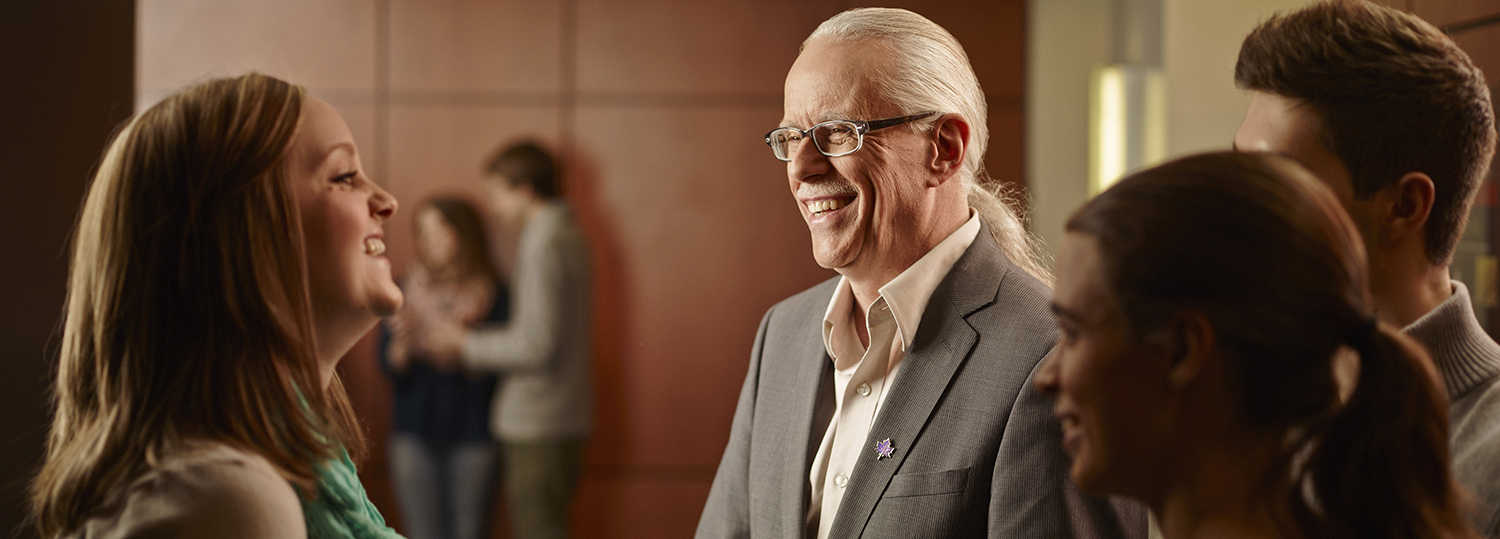
Glen Carruthers transformed Wilfrid Laurier University’s Faculty of Music during his 10 years as dean, implementing programs and initiatives that put the institution at the forefront of music education in Canada.
Through all of the changes, he always put students first.
Carruthers worked to make music education accessible to more students through the establishment of Laurier’s Bachelor of Music in Community Music and Master of Arts in Community Music. He expanded opportunities for students through partnerships with Conestoga College and Randolph College for the Performing Arts, as well as within Laurier through collaboration with the Faculty of Education.
Carruthers also worked to bring music to the community by negotiating the transfer of the Beckett School of Music, which provides music lessons to children and adults, to Laurier. He helped establish Laurier as the summer home of the National Youth Orchestra of Canada.
To better meet students’ needs, he reimagined the Faculty of Music’s space on Laurier’s Waterloo campus and helped launch the Making Space for Music campaign to turn the vision into reality. The result of those efforts – a renovation of the university’s Faculty of Music building – is tentatively scheduled to begin the summer of 2022.
Carruthers passed away on Dec. 24, 2020 at the age of 66 after a battle with cancer, leaving a lasting legacy at Laurier and within the Canadian music community.
In recognition of his loss, flags were lowered to half-mast across Laurier’s campuses, as well as at two other universities Carruthers worked at in the past, Brandon University in Manitoba, where he held the position of dean of the School of Music from 1998 to 2010, and Lakehead University in Thunder Bay, where he served as the founding chair of the Department of Music from 1988 to 1998. Hundreds of tributes to Carruthers poured in from around the world.
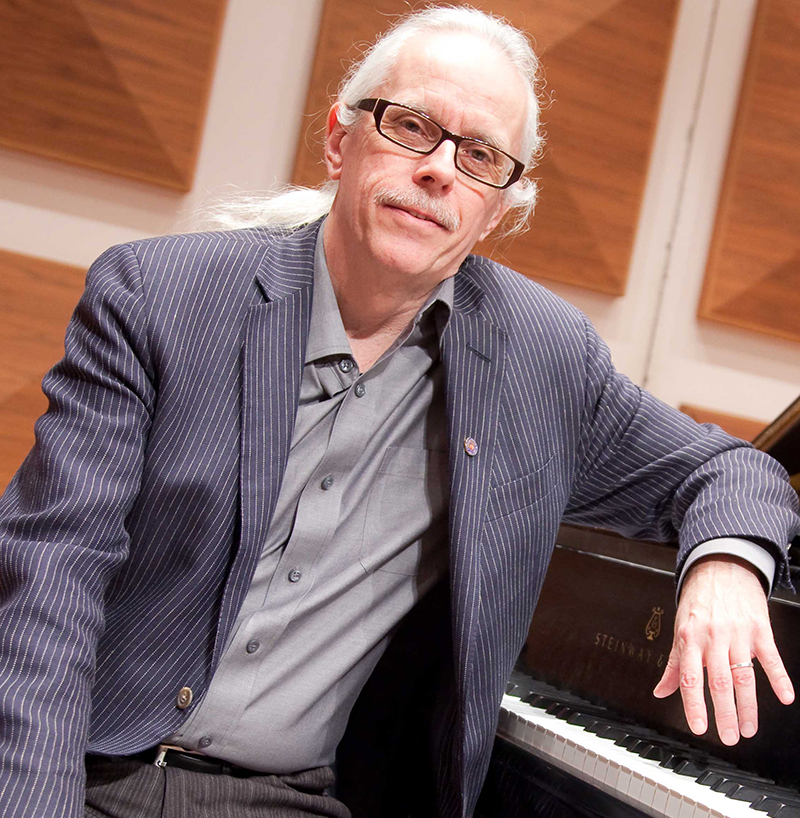
Former Faculty of Music dean Glen Carruthers passed away on Dec. 24, 2020 after a battle with cancer.
Following his passing, Laurier’s Faculty of Music dedicated a virtual Music at Noon concert to Carruthers. The Jan. 14 performance featured the Penderecki String Quartet performing Beethoven’s String Quartet No. 10, Op. 74, as well as a recording of Carruthers playing Bach’s Ich ruf zu dir (I Call to You) on the piano.
…
Though Carruthers had a grand vision for Laurier’s Faculty of Music and a schedule packed with meetings, he somehow made time for everyone. He would spend his evenings and weekends attending student concerts, sometimes seeing the same musical or opera more than once. He made time for open houses, recruitment fairs and fundraising events – even though his presence wasn’t expected – and would even hang posters for upcoming events.
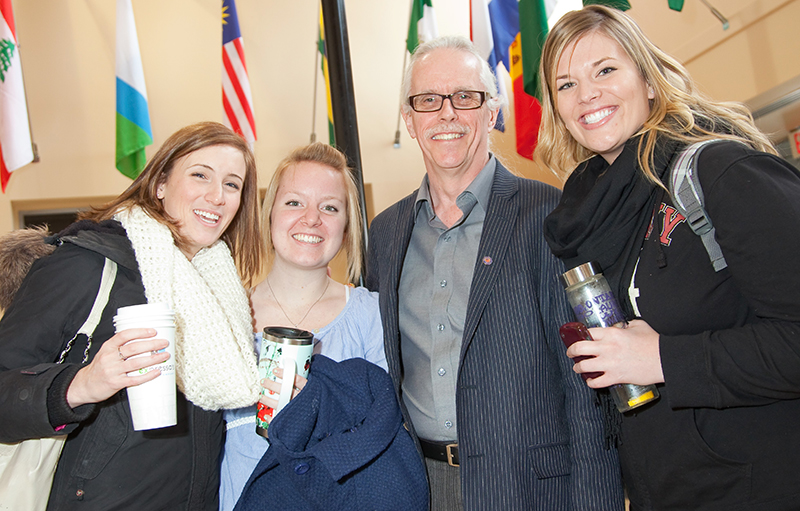
Glen Carruthers had a true open-door policy, welcoming unannounced visitors into his office throughout the day and maintaining connections with Faculty of Music students.
Carruthers gave his time and undivided attention to everyone he encountered, whether they were the president of the university or a first-year student. Though he met hundreds of students each year, he remembered their names and details about their lives. Even near the end of his life, Carruthers remembered to ask how a meeting went or how a project was coming along.
“He could remember details from years and years ago and I think that’s because Glen was always living in the moment,” says Jerzy Kaplanek, associate professor in the Faculty of Music and a member of the Penderecki String Quartet.
“He was always listening and always putting others first.”
Carruthers had a true open-door policy, welcoming unannounced visitors throughout the day. He also wandered the halls of the John Aird building, which houses the Faculty of Music, each day to “see his people” – Laurier’s music students. Students would often sit on the floor to chat between classes and Carruthers could often be found sitting with them.
“I always felt he had all the time in the world for me,” says Heather Carruthers, Glen’s wife of more than 35 years and a fellow musician. “I don’t know how he had all the time in the world for all these other people, too. Somehow, he had time for everybody. And they all felt loved.”
…
Before the creation of the Bachelor of Music in Community Music, Taylor Kurta, a singer-songwriter from Toronto, was one of the first non-classically trained students admitted to Laurier’s Bachelor of Music program. After winning the inaugural Canada’s Walk of Fame RBC Emerging Artist award in 2013, she set her sights on Laurier’s music therapy program.
With no formal music training, Kurta didn’t think she had a chance, but she applied anyway, singing a Ray Charles song during her audition. Kurta also set up a meeting with Carruthers. During the meeting, she argued music therapists shouldn’t have to be classical musicians. To her surprise, Carruthers agreed and accepted her application, even hiring a contemporary voice instructor to be her coach.
Kurta’s first few months at Laurier were challenging. She had taught herself music and was still learning some of the basics next to her classmates, many of whom had been learning music since they were children.
– Taylor Kurta
Once, Kurta walked into Carruthers’ office to tell him he had made a mistake letting her in. Another time, Carruthers found Kurta in the hallway crying. He sat with her, telling her she belonged at Laurier, that it would be very difficult, but that she would succeed.
“I remember being shocked that a dean would sit on the floor,” says Kurta. “There is this inherent power hierarchy in academia, but with Glen there was no ego. He was just one of us. Glen was so supportive and it wasn’t just with me. He was like that with every student in the program. That culture of acceptance must have trickled down to the rest of the faculty, too, because I felt so comfortable with all of them.”
Eight years later, Kurta is a registered music therapist studying toward her PhD in aging, health and well-being from the Department of Recreation and Leisure Studies at the University of Waterloo. She hopes to one day become a professor and show her students the same compassion and understanding Carruthers showed her.
…
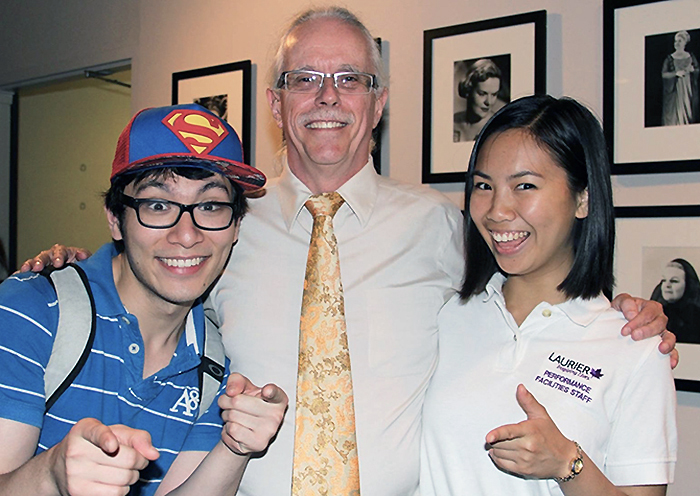
Glen Carruthers could often be found wandering the halls of the John Aird building to “see his people” – Laurier’s Faculty of Music students.
Students interested in studying music at Canadian universities tend to follow a similar path. They learn to play their instruments at a young age, often working their way through the Royal Conservatory of Music curriculum before applying to university, where they mainly study and perform classical music. Carruthers was keenly aware that the application criteria for most university music programs leaves out those who play different instruments, or different genres.
He was also aware it presented challenges for those who couldn’t afford formal music lessons growing up, those who studied in non-traditional programs and mature students.
By the time Carruthers arrived at Laurier in 2010, he had already met many scholars and practitioners around the world spearheading a different kind of music education: community music, which focuses on music in community settings such as schools, places of worship and seniors’ centres, with an emphasis on the well-being of both the musician and audience.
At Laurier, Professor Lee Willingham had already launched the Laurier Centre for Music in the Community, dedicated to connecting Laurier to the Waterloo Region community through music, community research and collaboration.
“Glen made a point of saying his job as dean was to always be examining and re-examining our programs,” says Willingham. “When we connected, we started talking about what we had and what we could have. Educational democracy was always top of mind with Glen. He’d ask, ‘Who isn’t here that could be here?’ We were a catalyst for each other.”
With Carruthers’ support and advocacy, the Faculty of Music launched the Master of Arts in Community Music in 2013 and the Bachelor of Music in Community Music in 2016, the only undergraduate program of its kind in Canada.
– Professor Lee Willingham
The programs immediately attracted international attention and within weeks there were far more applications than available spots. Today, the programs draw in a wide range of talented students, including singer-songwriters, rock, jazz, folk and R&B musicians, as well as those who play traditional music from cultures around the world.
The diverse range of musicians in the programs quickly warmed to Carruthers thanks to his love and extensive knowledge of a wide variety of music. He could speak about classical music greats such as Russian composer Sergei Rachmaninoff and rock icon Neil Young in the same breath and with equal admiration. While he and Heather would plan their vacations around classical concerts and operas, they also travelled the world to see rock concerts.
“He often spoke about non-classical musicians and that was really refreshing from a dean,” says Tamara Menon, a recent graduate of the undergraduate Community Music program. “That was just another way to relate with him. You don’t have to be well-versed or have these elite ideas about music, you could just be a lover of music and that was enough.”
…
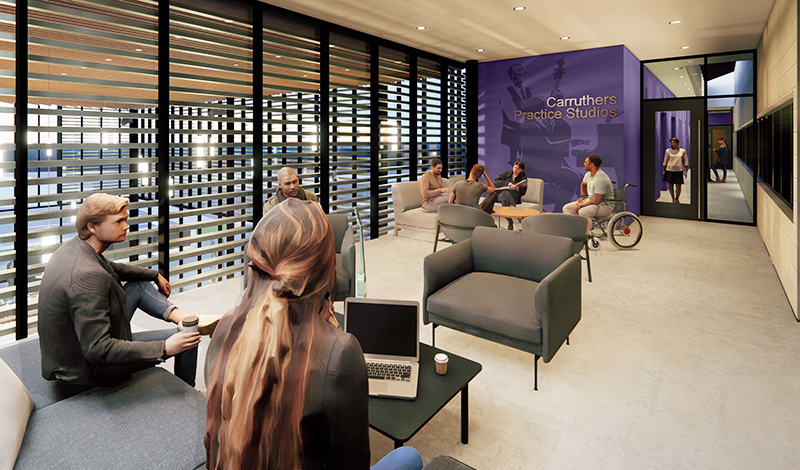
A planned renovation of Laurier's Faculty of Music building includes the new Carruthers Practice Studios, named in honour of Glen Carruthers.
When Carruthers would meet with donors about the Making Space for Music capital fundraising campaign, he would often share a story about how lost he was on his first day at Laurier as he searched for the front doors. He eventually found his way through the doors of the John Aird Building only to find stairs, then an elevator and a lot of cinder block, with no lobby or reception area in sight.
Only by taking the elevator up a floor or two and hearing music flow through the hallways did it become clear he had reached the right place.
Inspired by that first day, Carruthers began envisioning what the building – and the entrance to Laurier’s Waterloo campus from University Avenue – could be. Beginning early in his tenure as dean, he led consultations with students and faculty focusing on what they needed and wanted in the space, won approval from senior leadership and began meeting with an architecture firm about a potential redesign.
The latest designs for the soon-to-be-renovated and expanded Faculty of Music building show a modern, open-concept lobby and dramatic gateway entrance, which will draw in visitors while alluding to the abundant creative activity behind its walls. Most importantly, the space will better serve students, including its upgraded practice rooms and rehearsal spaces with floor-to-ceiling windows looking onto University Avenue.
After the Making Space for Music campaign launched in 2019, Carruthers assisted with fundraising, helping plan events and building close relationships with key donors including Savvas and Christine Chamberlain, who generously contributed $4 million to the campaign through the Savvas Chamberlain Family Foundation; Laurier Chancellor Eileen Mercier (BA ’68, LLD ’13), who donated $250,000 toward the campaign; and Robert and Judith Astley, who also made a generous contribution.
– Kathryn Jeffrey
A month before Carruthers’ passing, the Astleys committed to matching donations up to $375,000 toward the building’s practice studios, which will be named the Carruthers Practice Studios in his memory. In less than three months, the campaign raised $770,000 with the help of 255 donors.
“Glen really drew people in when he started talking about the project and, for him, it was all about the students,” says Kathryn Jeffrey, associate director of development for the Faculty of Music and coordinator of the Making Space for Music campaign. “So much of the success we’ve had with the campaign was because of Glen’s passion and vision.”
…
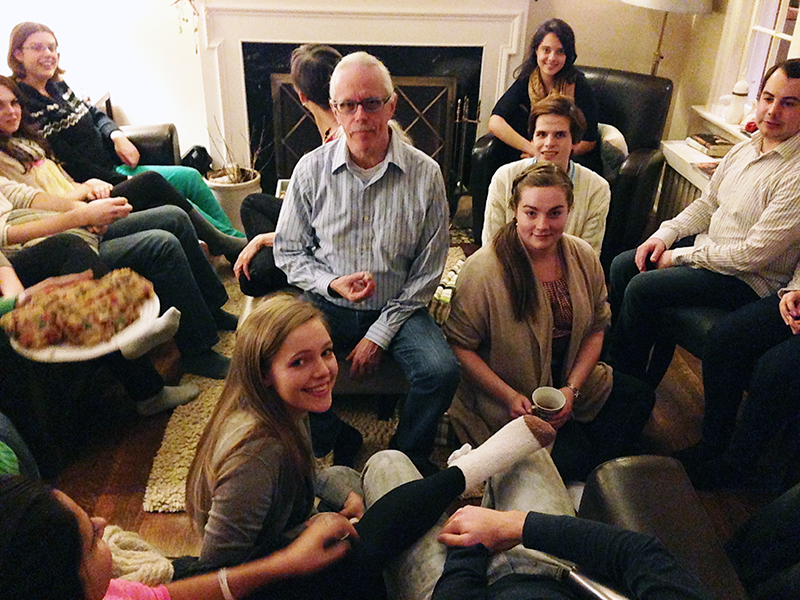
Glen Carruthers and his wife, Heather, often welcomed Faculty of Music students into their home for social gatherings. After Carruthers became ill, groups of students and faculty members organized backyard concerts at the Carruthers’ residence to show their appreciation.
Though Carruthers stepped down as dean about a year before he passed away, he never stopped wanting to know what was happening in the Faculty of Music and remained closely involved with the Making Space for Music campaign.
“He always wanted to know what was going on at Laurier, how things were going,” says Christine Vlajk, Laurier’s artist-in-residence in viola and chamber music and a member of the Penderecki String Quartet. “It wasn’t just shop talk to him, it was love. It was near and dear to his heart.”
Faculty, staff and students continued to visit Carruthers until the end of his life and helped when they could. During the summer, groups of students and faculty members showed their appreciation by organizing concerts in Carruthers’ backyard. He would dress up for the occasion, thank everyone and share a story or two.
One of Carruthers’ trademarks was his tendency to begin sharing an anecdote at the end of a meeting or visit, then stop himself to say, “Well, I’ll tell you about it some other time.”
One of Vlajk’s last memories of Carruthers stands out. Not long before he passed away, Carruthers told her a story about a student who gave him a signed musical piece for his autograph collection.
“And he said, ‘I’ll show you some time,’” recalls Vlajk. “Then he got up and said, ‘You know what? Why don’t I show you now.’”